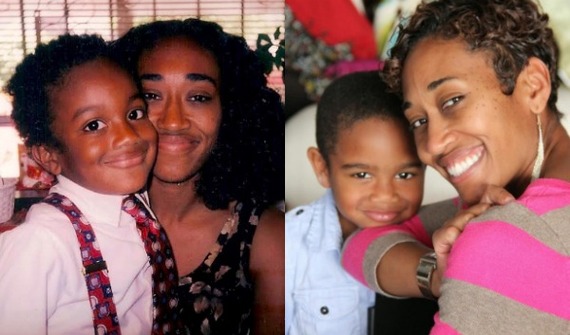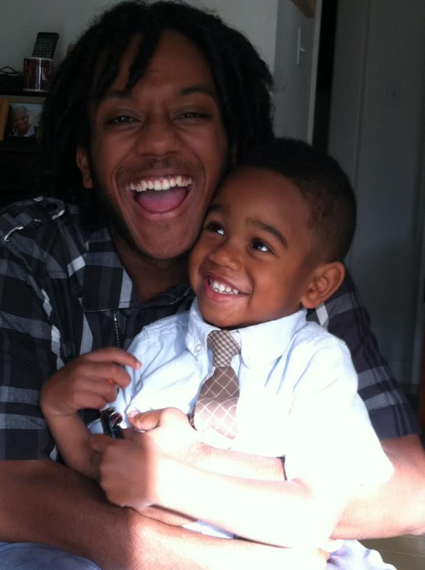By Meilan Carter-Gilkey
My 4-year-old, Mateo, was playing with his Lego police car last week when he asked a question that shocked me. "The police don't shoot people, right, Mommy?"
I was floored. I didn't know why he would ask this. We don't allow him to watch violent shows or the news or even let him play with guns. Could he have overheard something? I hesitated. With the wounds of Ferguson still very fresh, I thought of the history of the police shooting our children, our men, and all of our people, but I knew it was too early to teach that lesson. At 4, Mateo is at an age where he latches onto ideas. He would be frightened of the police if I told him the truth, and he would tell his friends at school.
My voice wavered as I said, "No, honey. The police don't shoot people." As the words left my lips, I couldn't help but think about the conversation that I already had 17 years ago with his 21-year-old brother Kamau -- one that Mateo and I will eventually need to have.
As a parent, there's an overwhelming feeling of powerlessness when you know that you cannot protect your child, that there isn't anything education, money, or geographic diversity can do to remove them from harm's way. We have moved to a safe suburban neighborhood, but now I worry that our elderly neighbors may call the police on Kamau when he walks home at night with his hoodie on. With every high-profile death of a young black man, we've had to remind Kamau of the survival tips that may not really protect him, while trying to reassure him that he is indeed safe. It is a futile mission, as the list of young people murdered continues to grow, but one I can't give up. The idea of sharing these stories with Mateo is agonizing -- he believes in the good of the police and in his total safety. As I did with his brother, his father and I will have to destroy his faith in both.
When my oldest son was 4 years old we had our first conversations about race. He was in preschool and playing Martin Luther King Jr. in the school's Black History Month performance. Although we had already discussed some of the history of the civil rights movement, he was finally old enough to understand more about how he was affected by race. Learning about Rosa Parks and the Montgomery Bus Boycott brought a whole new meaning to the word black, but he insisted, "We're not black Mommy, we're brown."
We spent a lot of time discussing skin color. "Is she white?" he asked about a light-skinned friend. I tried to explain to him complexion and identity, but then he asked why his white friends weren't "light skinned." It was painful when Kamau realized that people were labeled and that those labels meant something. He couldn't understand why everyone wasn't treated the same. Mateo has also claimed that "we are not black -- we are brown," and I wonder how different his understanding of race will be compared to his brother's. In a time when diversity is a common word and with a more heightened awareness of race in this country, there are still many difficult lessons to teach.
By the time Kamau was about 8 or 9 years old, I explained to him in great detail about the hazards of being a black male around the police. We had recently moved to New York and the horrific shooting death of Amadou Diallo by the police two years earlier was still painfully on my mind. I was a single mom and Kamau was starting to walk home the three blocks from school to our apartment in the Park Slope neighborhood of Brooklyn. I knew that my son was no longer of the little boy non-threatening age, so I had to prepare him. "If you ever get stopped by the police, even if you know you didn't do anything wrong, put your hands up," I told him. My voice shook as I spoke. "Do not fight back or say anything rude. Say 'yes, sir' and 'no, sir,' do not make any sudden moves, and most of all, do not run!" I was tingling with frustration and fear, knowing that to the world he was now a black man. I held back the tears as I told him about his uncle being beaten by the police for running for the bus and escaping with a hairline fracture to the skull. There were and still are so many more stories, but I focused on keeping Kamau from having a story of his own.
Throughout his adolescence I wanted Kamau home by dark, especially when we lived in less-desirable neighborhoods. He doesn't drive and while I was worried that he might be robbed or jumped by the young men on the corners, I was more concerned that the police would shine a bright light on him and he would end up face down in the street.
Two months ago Kamau's best friend got his first car and within the first two weeks he and Kamau were pulled over twice. The first stop was for making a U-turn on our street -- something that my neighbors, my husband, and I do every day. Kamau was terrified -- growing up in Oakland and watching the protests for Oscar Grant's death from his high school, he worried that they might get shot on that sunny Saturday afternoon in the suburbs. Fortunately, they didn't get hurt, ticketed, or arrested, but they were questioned and asked for identification. (I believe showing the police their college IDs was the pass that transformed them from potential drug dealers or gang members into non-threatening college students.)
My husband and I were infuriated; it immediately took us back to our own pasts in which we were forced to sit on curbs, spread our hands on the hoods of police cars, and be questioned without breaking a single law. I still cringe at the memory of an officer illegally searching my friend's car and joking that we "ought to be arrested for not having any Bobby Brown tapes in the car." Fortunately, I have the hope that Mateo will emotionally survive this reality as his brother and his parents have.
The challenge is knowing when to tell your child that the world looks at you differently, that it isn't fair, and that your very life may be in danger because of what you look like. After you figure out when to unleash that heartbreak, you have to be prepared to fortify them and help them learn that they are strong, beautiful, and worthy of better. Even moments that may appear benign (like when my husband's co-workers repeatedly confuse him with the one other black man in the department -- who works on another floor) have to be seized to illustrate the depths of racism and the need for change. Showing our sons examples of discrimination and resilience, our passion for equality, and our refusal to be complacent is more than necessary. I owe it to my children to raise their awareness -- no matter how painful it may be -- but at the appropriate time. It is a precarious balancing act that can be tipped at any moment.
I have the hope that Mateo will emotionally survive this reality as his brother and his parents have.
The night before starting T-ball lessons with his best friend last month, Mateo asked another question that I was unprepared for: "Are there going to be any brown people there?" Caught off guard that his anxiety was not about hitting the ball, but about being isolated, I said, "Why are you asking that, sweetie?" Mateo replied that when he's with this friend, who is white, he's usually the only "brown" boy around. When I asked if that made him feel strange, he nodded and said, "I just want to know if there will be people there who look like me."
Although this was not our first conversation about race, I was taken aback that he could so clearly express his awareness and desire for community. These are the moments when our children are driving the lessons and letting us know what they are ready for. They are having their own experiences and drawing their own conclusions, and we have to encourage and shepherd them through those moments.
Giving our sons positive reinforcement, support, and love is how we help them see themselves. When Kamau, who is studying abroad in Japan, titled his blog "Brothaman in Japan" and when Mateo excitedly pointed out characters in his story books and said they were "brown like me," I felt hopeful about their collective sense of identity and pride. Understanding their differences and how the world sees them does not negate how precious they are -- in fact I think it informs their strength and the ways they move through the world. Their ability to survive the talk and navigate through the world is meaningless if they do not love themselves and where they come from. In a constantly changing world it is impossible to anticipate all of our children's experiences or to provide perfect solutions, but as parents we will continue to use our love to impart all that we can in the hopes that they become men who will teach their own lessons.
Meilan Carter-Gilkey is a freelance writer and a writing coach, who blogs about being a parent of sons 16 years apart. She has an MFA from Mills College in creative writing and her work has appeared in Mutha Magazine, Heart&Soul, and elsewhere.
Visit mater mea for more articles and essays celebrating women of color at the intersection of career and family.

